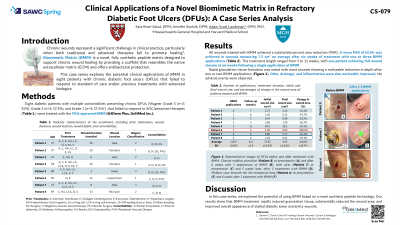Case Series/Study
(CS-079) Clinical Applications of a Novel Biomimetic Matrix in Refractory Diabetic Foot Ulcers (DFUs): A Case Series Analysis
Friday, May 2, 2025
7:45 PM - 8:45 PM East Coast USA Time

Sara Rose-Salud, DPM – Massachusetts General Hospital, Foot & Ankle Center, Boston, MA; Jennifer Skolnik, DPM – Massachusetts General Hospital, Foot & Ankle Center
Introduction: Chronic wounds represent a significant challenge in clinical practice, particularly when traditional therapies fail to induce healing1. Biomimetic Matrix (BMM) is a fully synthetic peptide matrix designed to support chronic wound healing by providing a scaffold similar to the native extracellular matrix (ECM) with antibacterial protection. This preliminary case series explores the potential clinical applications of BMM in eight patients with chronic diabetic foot ulcers (DFUs) that fail to respond to standard of care and/or previous treatments with biologics.
Methods: Eight patients with chronic DFUs and multiple comorbidities, including venous stasis, Charcot neuroarthropathy, obesity, osteomyelitis, peripheral vascular disease, and partial foot amputation, were treated with the FDA-approved BMM. All patients received appropriate off-loading to protect the wound site. Wounds were measured and photographed before the initial application and at subsequent visits.
Results: The wounds in this clinical case series consisted of Wagner Grade 3 (n=2; 25%), Grade 2 (n=3; 37.5%), and Grade 1 (n=3; 37.5%) ulcers. All patients treated with BMM achieved a substantial reduction in the percent wound area, with a reduction of 63.6% in wounds measuring 7.5 cm2 on average after six weeks of treatment with one to three applications. Odor, drainage, inflammation, and reepithelization were also noticeably improved, with most wounds showing a reduction in depth within one or two BMM applications. The treatment length ranged from 5 to 11 weeks, with one patient achieving full wound closure at six weeks following a single application of BMM.
Discussion: In this small case series, we explored the potential of using BMM based on a novel synthetic peptide technology. Our results show that BMM treatment substantially reduced the wound area, improved overall appearance, and reduced the depth of complex, stalled chronic diabetic lower extremity wounds.
Methods: Eight patients with chronic DFUs and multiple comorbidities, including venous stasis, Charcot neuroarthropathy, obesity, osteomyelitis, peripheral vascular disease, and partial foot amputation, were treated with the FDA-approved BMM. All patients received appropriate off-loading to protect the wound site. Wounds were measured and photographed before the initial application and at subsequent visits.
Results: The wounds in this clinical case series consisted of Wagner Grade 3 (n=2; 25%), Grade 2 (n=3; 37.5%), and Grade 1 (n=3; 37.5%) ulcers. All patients treated with BMM achieved a substantial reduction in the percent wound area, with a reduction of 63.6% in wounds measuring 7.5 cm2 on average after six weeks of treatment with one to three applications. Odor, drainage, inflammation, and reepithelization were also noticeably improved, with most wounds showing a reduction in depth within one or two BMM applications. The treatment length ranged from 5 to 11 weeks, with one patient achieving full wound closure at six weeks following a single application of BMM.
Discussion: In this small case series, we explored the potential of using BMM based on a novel synthetic peptide technology. Our results show that BMM treatment substantially reduced the wound area, improved overall appearance, and reduced the depth of complex, stalled chronic diabetic lower extremity wounds.

.jpg)